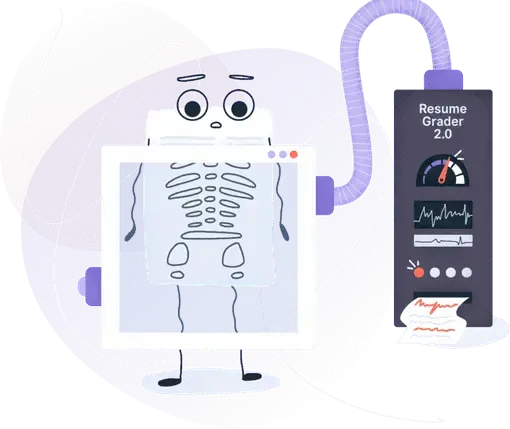Videography Skills: Example Usage on Resumes, Skill Set & Top Keywords in 2025
Including videography on your resume suggests to recruiters that you have a creative flair and an ability to convey stories visually, highlighting your artistic and technical skills. Dive into the guide below for inspiration on how to effectively showcase your talents on your CV and consider various expressions and usages to capture attention.


Is your resume ATS-friendly?
Drop your resume here or upload a file to find out if the skills in your resume are readable by an ATS.
Videography is the skill of shooting videos and managing digital motion picture production. This includes capture, editing, sound design, and sometimes directing to create visual storytelling or record events. Having videography skills on your resume can show potential employers that you are creative, detail-oriented, and capable of handling the technical aspects of video production. These skills are especially valuable in marketing, media, entertainment, and anywhere visual content is essential.
Yet, listing videography on your resume might not always be beneficial. If the job doesn't require video production skills, it could be seen as irrelevant and clutter up your resume with unnecessary information. Additionally, if you are not highly skilled in videography, it might expose a weakness rather than act as a strength. Instead of simply adding "videography" to your list of skills, it could be more impactful to describe specific relevant projects you've completed or link to a portfolio of your work.
In this article, you will learn:
- How to illustrate your videography experience effectively on your resume.
- The potential drawbacks of listing videography as a skill if it’s not related to the job.
- Alternate ways of presenting your videography expertise to attract employers' attention.
Misusage of videography on resumes
Videography skills can significantly bolster a resume by demonstrating creativity and technical competence, but improper presentation of these abilities may detract from your professionalism. An effective resume cleanly showcases pertinent skills without overstatement or irrelevance.
- In the summary section: Listing "Videography wizard who can transform any concept into cinematic gold" exaggerates expertise and injects an informal tone.
- In the experience section: Describing a role with "Used my video skills to film company events" fails to specify the impact or scope of videography work.
- In the achievements section: Stating "Single-handedly revolutionized the company's social media with cool videos" lacks measured results and can come off as unsubstantiated boasting.
How to demonstrate videography skills on your resume
- Highlight your portfolio by including a link to your online showcase with a variety of video projects that demonstrate your skills in video production and editing.
- List specific video projects you've worked on, noting the role you played and any successful outcomes, such as views or awards won, to show your direct experience and achievements.
- Describe your technical skills with video equipment and editing software, mentioning any advanced proficiencies or certifications that can support your proficiency in videography.
- Detail your experience with storytelling by explaining how you've effectively communicated themes or narratives through your video work, thereby showing your creative abilities.
- Include any relevant education or training, such as videography courses or workshops, which will validate your knowledge and dedication to staying current with video techniques and technologies.
Example 1: Demonstrate videography in the experience section
- •Led a team of 10 videographers and editors, overseeing the production of over 300 video projects, each enhancing brand visibility and audience engagement for our clients.
- •Increased client video viewership by 40% within the first year by introducing drone footage and cinematic editing techniques that highlighted product features more vividly.
- •Managed the company's largest video project with a budget of $500K, resulting in a national award-winning ad campaign that boosted the client's sales by 25%.
- •Crafted over 200 personalized wedding videos that garnered positive client feedback and generated a 60% referral rate for new business.
- •Trained 5 junior videographers in advanced shooting techniques, dramatically improving the quality of footage captured at each event.
- •Implemented a new video editing workflow that slashed production times by 30% without compromising the storytelling aspect of our videos.
- •Delivered 150+ video projects, including commercials, training videos, and event coverages that consistently exceeded client expectations for quality and impact.
- •Cultivated long-term relationships with 10+ recurring clients by producing content that significantly increased their online engagement and customer outreach.
- •Introduced time-saving video editing software to my workflow, which cut down editing time by 25% and allowed for faster project turnaround and increased client satisfaction.
- Writing clear job titles and company names gives your resume's experience section structure and makes it easy to read.
- Highlighting specific numbers and results, like increased viewership or budget management, shows potential employers your concrete achievements.
- Describing a variety of work scenarios, from leading teams to handling budgets, demonstrates your versatility as a professional.
- Focusing on successful projects helps anyone looking at your resume understand the direct impact of your work.
- Using simple language and avoiding jargon makes your resume accessible to everyone while still being professional.
Example 2: Demonstrate videography in the summary section
- A long, detailed summary shows a clear picture of the applicant's skills and experience.
- Highlighting technical expertise, like proficiency in Adobe Premiere Pro and After Effects, offers a clear understanding of the applicant's capabilities.
- Mentioning a significant career milestone, like the acclaimed short film, demonstrates a track record of success and an ability to achieve high standards in video production.
- Using simple language, without jargon, ensures clarity and better communication of the applicant’s qualifications.
- Conveying enthusiasm for storytelling through videography can engage the reader and make the summary more compelling.
- Direct descriptions of experience and achievements without the use of cliches or fluff add professional value to the summary.
Example 3: Demonstrate videography in the achievements section
- This resume section clearly shows the applicant's videography achievements through specific examples and outcomes.
- Numerical results are included, demonstrating the positive impact of the applicant's work.
- Each achievement is concise, avoiding unnecessary jargon, and focuses on the value delivered.
- Real-world scenarios are described, providing context that showcases the applicant's experience.
- The use of plain language makes the content easily understandable for readers at any level.
- Titles are kept short for quick scanning, while descriptions offer enough detail to convey the achievement.
What are relevant certifications for videography skills on resume
If you're looking to advance your videography skills and add credibility to your resume, acquiring a specialized certificate can be a useful step. Here's a list of relevant certificates in the field:
The top 5 certifications for gaining videography skills expertise:
Become an expert in Adobe Premiere Pro, a leading software for video editing. This certificate shows your advanced skill level which can aid in editing projects, improving workflow, and professional growth.
A certification that affirms your capabilities in the field of professional videography. It can help in attracting clients by demonstrating proficiency in video production.
Showcase your editing skills with Apple's professional video editing software. This certificate is ideal for those who wish to validate their expertise in Final Cut Pro X to potential employers or clients.
Although more technical, this certification proves your understanding of electronic fundamentals essential for managing and troubleshooting video equipment.
This program offers expertise in content ownership, video production, and channel growth on YouTube, beneficial for videographers aiming to maximize their presence on the platform.
Top skills people add together with videography skill on resume:
Video Editing
Photography
Graphic Design
Motion Graphics
Storyboarding
Color Grading
Sound Editing
Lighting Techniques
Drone Operation
Script Writing
Creativity
Attention to Detail
Time Management
Storytelling
Adaptability
Teamwork
Communication
Problem-Solving
Patience
Organizational Skills
Active Listening
Most relevant jobs for videography skills
Videography skills are essential in a range of creative and technical professions. Professionals with these skills capture, edit, and produce video content for various purposes, such as storytelling, marketing, and education. Those adept in videography possess an eye for visual detail and a knack for engaging storytelling, and they understand the technical aspects of camera operation, lighting, and post-production. A strong portfolio demonstrating proficiency in video production can be key to success in these roles.
- Video editor
- Camera operator
- Film director
- Producer
- Content creator
- Wedding videographer
- Cinematographer
- Corporate video producer
- Documentary filmmaker
- Digital media specialist
Key takeaways
- Videography is a valuable skill for your resume, setting you apart in job applications and potentially opening doors to creative and dynamic roles.
- Abusing videography skills can harm your credibility; always use this skill ethically and with respect to privacy laws.
- Showcase your videography expertise on your resume by including specific projects, your role, the impact of your work, and any recognition received.
Make one that's truly you.




